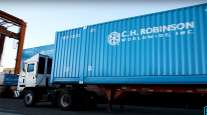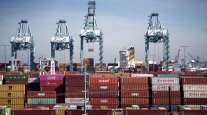Senior Reporter
Shippers, Retailers Focus on Upcoming ILWU, PMA Contract Talks

[Stay on top of transportation news: Get TTNews in your inbox.]
The retail sector is urging West Coast port workers and leaders to begin negotiations early on a new labor contract, a move that could prevent potential future delays at facilities that already are dealing with backlogs.
A June 30 deadline on a new labor deal is looming between the International Longshore & Warehouse Union workers and its West Coast employers, led by the Pacific Maritime Association. In a Feb. 24 letter, the National Retail Federation urged both sides to begin contract negotiations well before that deadline to help ensure continued cargo movement.
A potential seven-year contract for the 29 PMA locations covered under the master contract would cover more than 15,000 port and office workers at some of nation’s busiest water and inland container ports, including Los Angeles, Long Beach, Calif., Oakland, Calif., Portland, Ore., and Seattle/Tacoma, as well as other waterfront locations along the Pacific Coast.
“We know key issues for both parties need to be worked out during this contract negotiation and believe the parties should sit down now and not wait to begin negotiations,” NRF President Matthew Shay wrote. “We would further ask that you issue a statement committing to the commencement of meaningful negotiations now, and to commit to continue negotiating and working without interruption, even if negotiations extend beyond the June 30 contract expiration.”

Shay
The PMA in November requested a one-year contract extension amid the ongoing supply chain challenges that are vexing ports nationwide, but ILWU rejected the offer and confirmed it wanted to begin negotiating a new contract. In announcing its decision the ILWU said it “welcomed” an opportunity to begin collective bargaining talks.
Shortly after the ILWU announcement, the top 10 publicly traded shipping companies announced they were on track to earn billions in record revenue and profits, as overseas shipping rates have doubled and tripled when measured against 2020’s levels. Maersk, the world’s second-largest shipping company, on Feb. 9 said 2021 was a record year buoyed by “exceptional market conditions which led to record-high growth and profitability.”
Maersk ranks No. 4 on the Transport Topics Top 50 list of the largest global freight carriers.
With early 2022 container shipping levels maintaining those all-time levels, industry experts and shippers are watching the upcoming negotiations closely. Leading up to the talks, both union and management representatives have worked to reassure port leaders, shippers and retailers that discussions will stay focused on the key economic and workplace issues.
Transportation economist Paul Bingham told Transport Topics that the two sides realize the stakes are high, especially with what he described as extraordinary work the longshoremen have done the past two years, with pandemic-related challenges and month after month of record volumes at ports.

Bingham
“Both sides have a lot of vested interest in these negotiations,” Bingham said. “The stakes could not be any higher in terms of the national attention on the topic. These negotiations are going to happen in a context that’s never been done before, which is, with much more attention based on what’s happened in the last two years on the West Coast. And that means there’s some unpredictability about it.”
Besides salary and benefits, Bingham expects the two sides could clash over the PMA’s desire to increase automated cargo handling, claiming it improves overall port efficiency and lowers shipping costs.
“The shippers look at the U.S. ports and say, you know, we would like to make capital investments that would make a difference here in terms of the productivity, which is normal for a business owner. And they’re very limited, you know, in part by what they can have the workforce do under the contract,” he said.
“Our record-breaking January reflects the great efforts of our longshore workers, truckers and terminal operators,” Port of Los Angeles Executive Director Eugene Seroka said when the facility’s container volume numbers for that month were announced.

Seroka
Throughout the last two years, port leaders have regularly praised ILWU workers for their professionalism and diligence, and for staying on the job during the early days of the pandemic before vaccines were developed. The union said more than 1,700 dockworkers had become ill during the pandemic, and as of last summer, two had died.
The NRF in the letter noted that some of their members are beginning to plan contingencies in the event an agreement is not reached by the deadline.
“Any kind of additional disruptions at the ports would add further costly delays to our members’ supply chains and likely add to inflation concerns and further threaten the economic recovery,” Shay wrote. “Many members are already looking to put in place mitigation strategies to address additional disruptions related to the contract negotiations,”
Want more news? Listen to today's daily briefing below or go here for more info:




